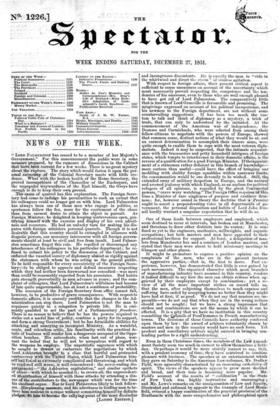• :- . One of those feuds between employers and
employed, 'which- seem destined to recur,at intervals; has broken.out at Manchester,: and threatens to draw other districts into its vortei:, It' ia:enn:-' fined:as yet to ,the engineers; mechanics, millwrights, and .:co'gniste: occupations ; but both masters, and men have appealed to their prrifessional brethren for support. At least, a delegation of nits- 1: ters from Manchester has met a conclave of London masters, and stated. that their men were about to hold missionary meetingsin Glasgow and other places. It might be premature to express a, positive . opinion on the complaints of the , men, who are in the present instance the aaressive partila,—that is, the first to move. Past ex- perience, however, has demonstrated that little is ever gained by, such movements. The organized character which most branches , of manufacturing industry haie assumed in 'this country, feridersi it indeed difficult tb say how the men canobtain redress when ;ag- grieved by -their employers except by combination ; yet • a re- view of all the More important 'strikes on record Jells us, that the men, after subjecting themselves to much expense and suffering have ended by accepting terms no better than they might have had at first, if as good. We do not say that are im- peceablewe do not say that when they are in the wrong redreSsi- should not be sought ; but we have a strong iiiipression -that strikes and combinations are not the means by which it can be effected. It is a pity that we have no institution in this ieonntry resembling the gatmoila of Prud'hinniaes-in Frei& manufacturing Owns. The decisions of those Councils have authority conferred upon them by la* :' the award of arbiters voluntarily chosen by Masters and men in this country would have no such force. Yet prudent and conciliatory arbiters- inight succeed in bringing con- tending parties to-a right -undenitanding. - -


























